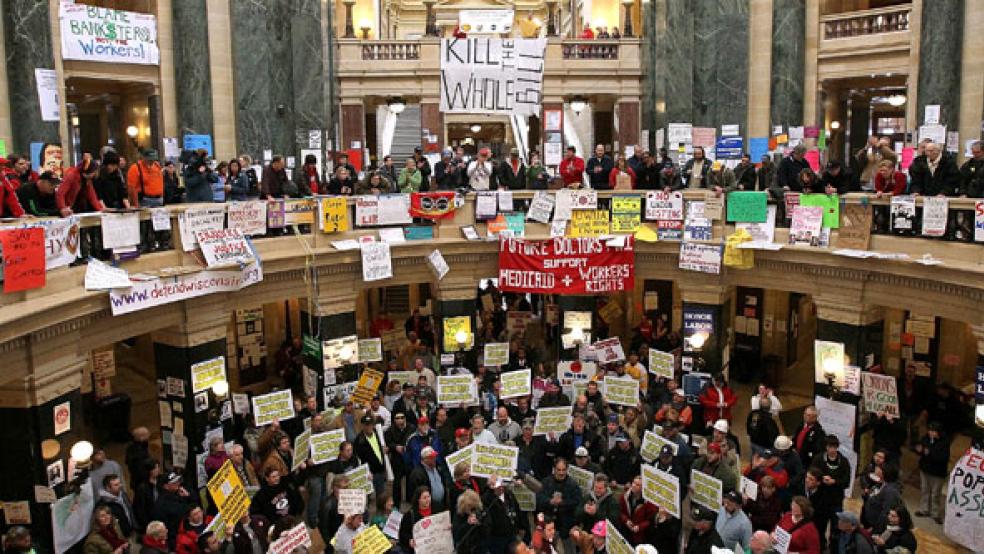Have we reached a watershed moment for the labor movement? Earlier this year, Indiana became the first Rust Belt state to enact right-to-work laws. Arizona made their already-restrictive environment even tougher. And now, after targeting Wisconsin Governor Scott Walker and other republican lawmakers for more than a year, the labor movement has come up empty.

In Wisconsin, Walker’s reforms of public-sector collective bargaining were at issue. Democrats nationwide allied themselves with the unions in pushing for recall elections, and liberal pundits promised they would stop this encroachment on labor prerogatives and send a lesson to other governors around the nation. In that, at least, they succeeded, but not in the way the unions had hoped.
RELATED: Romney Accuses Obama of Pandering to Big Labor
Despite the high-profile campaign waged by the labor movement in Wisconsin -- where unions have a long history of support – Wisconsin voters reaffirmed Walker as their governor. In fact, Walker won 125,000 more votes in the special recall election than he did in 2010, which was known as a wave election for Tea Party conservatives. He bested the same opponent, Milwaukee mayor Tom Barrett, by an even wider margin of seven points rather than the five-point victory 19 months earlier.
The lone bright spot for the recall effort was that the Democrats did take control of the state Senate by winning one of the four recall races in the chamber. The bad news, however, is that the Senate won’t be in session for the rest of the year – and the new redistricting plan goes into effect in November’s election, when 16 of the body’s 33 seats will be up for grabs. The new plan gives Republicans a good chance to win back two Democratic seats, which means that the state Senate may never get gaveled into session by new majority leader Mark Miller.
The results exposedlabor’s weakness rather than strength. While it might not encourage other states to take drastic action to reduce the collective bargaining power, the impotence of the unions in what had been the heart of the progressive Midwest certainly won’t convince anyone not to try. Thanks to the millions spent by the unions in a failed attempt at undoing the 2010 election, Big Labor might not have the resources to fight on this scale again, especially with the national election on the horizon.
Nor was this the only big loss that unions took on Tuesday night. In California, where public-employee unions have exerted a strong influence on politics for decades, two cities defied the PEUs to pass badly-needed pension reforms. That may not have come as a big surprise in relatively conservative San Diego, where pension obligations now eat up 20 percent of the city’s operating budget. Halfway up the coast, though, San Jose and its Democratic-dominated government successfully convinced voters to enact a similar kind of pension reform in order to reduce the 27 percent drag on the city’s operating budget. In both cases, the unions fought the referendums, but in both cases they lost big; 66 percent of San Diego voters backed the reforms, while 70 percent in San Jose did the same.
RELATED: Bloated Union Contracts Have Busted State Budgets
On the other hand, Ohio pushed through more expansive public-employee union reforms in 2010 than Walker attempted in Wisconsin, and had those rolled back by a voter initiative last fall. Until last night, the labor movement pointed to that victory in Ohio as a sign of rebounding momentum, an argument that expired last night in Wisconsin.
Immediately, complaints arose over a disparity in financing between the two candidates in the recall election as an excuse for the unions’ failure. Scott Walker raised ahuge amount of money, a good portion from outside of Wisconsin, while Democrats and the unions circulated recall petitions. However, the unions spent millions of dollars to get the recall election in the first place, and then provided a large boost to Barrett in organizing and GOTV efforts. Those actually succeeded – turnout was high in Democratic areas – but Walker’s GOTV outpaced the union efforts as voters thundered to the polls to support the governor and his PEU reforms.
That is a bad sign for labor, with its modern reliance on organizing in the public sector. Walker pulled back the green curtain on the unhealthy relationship between PEUs and politicians, which creates an accountability gap on spending and an obstacle to efficiency in government. Instead of taxpayers controlling the size of government, the PEUs ensure that they control policy, mainly by forcing the state to fund political operations, through mandatory state-collected dues and ridiculously overpriced benefits from union-owned providers, such as the WEAC Trust in Wisconsin prior to the Act 10 reforms.
Voters in Wisconsin sent Walker to the capital in 2010 based on his promise to reform that PEU-government relationship and to impose fiscal discipline on state spending. They reaffirmed him as governor for delivering on those promises. If voters in Wisconsin and California have had enough of the influence that public-employee unions have on policy, the union movement won’t find many safe havens elsewhere in the country – and taxpayers may finally regain control over reckless spending at the state and local level.






